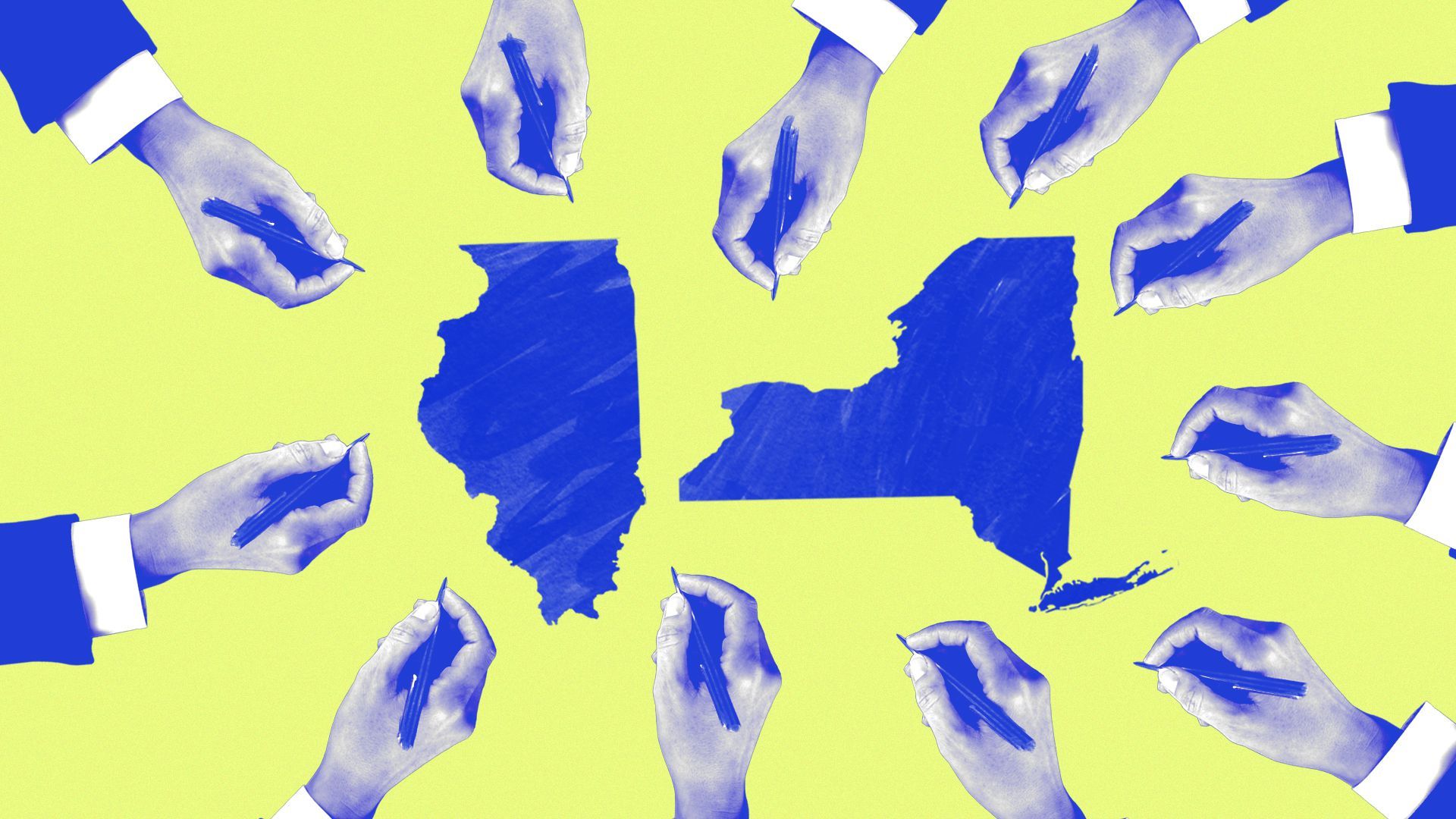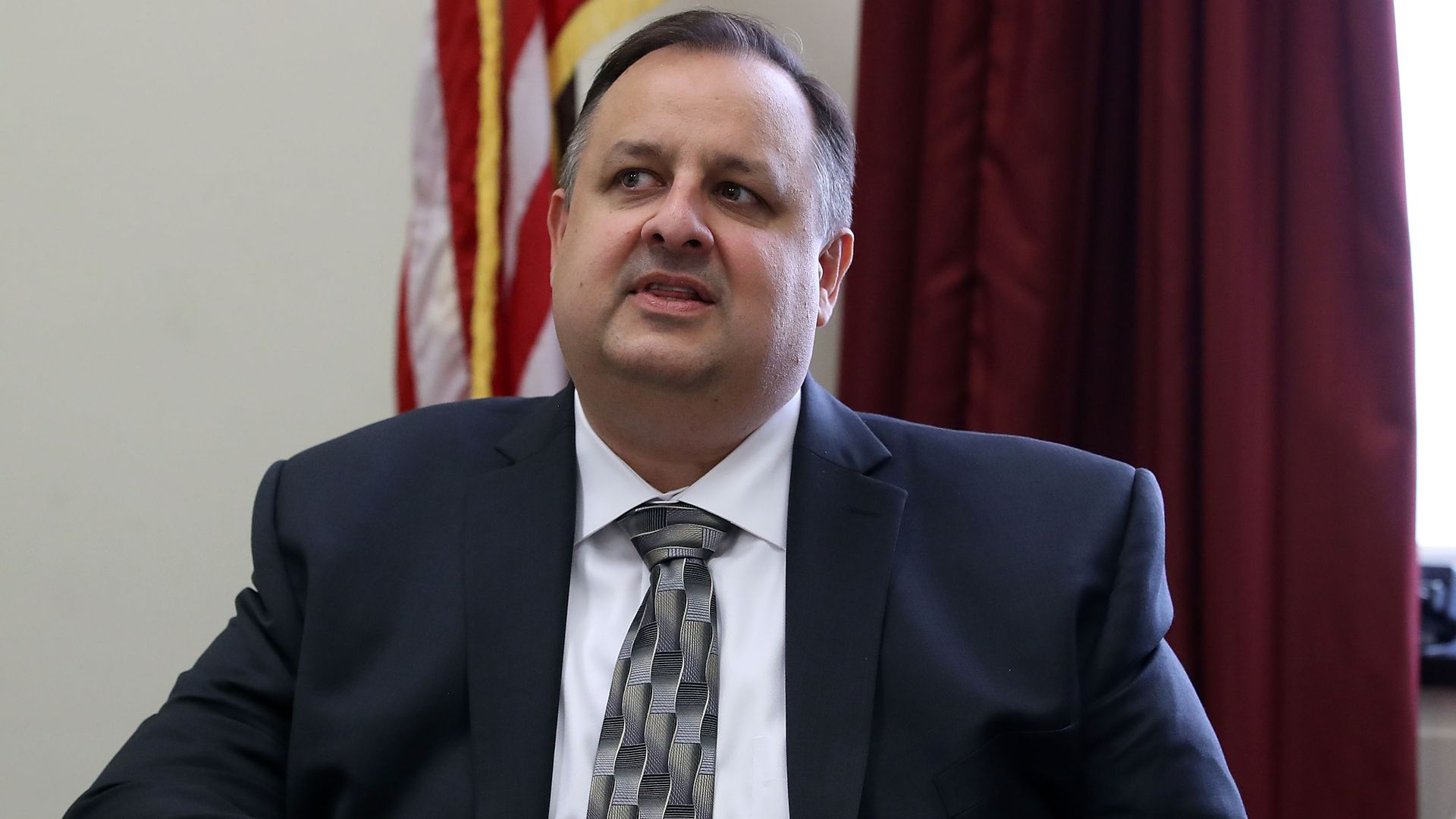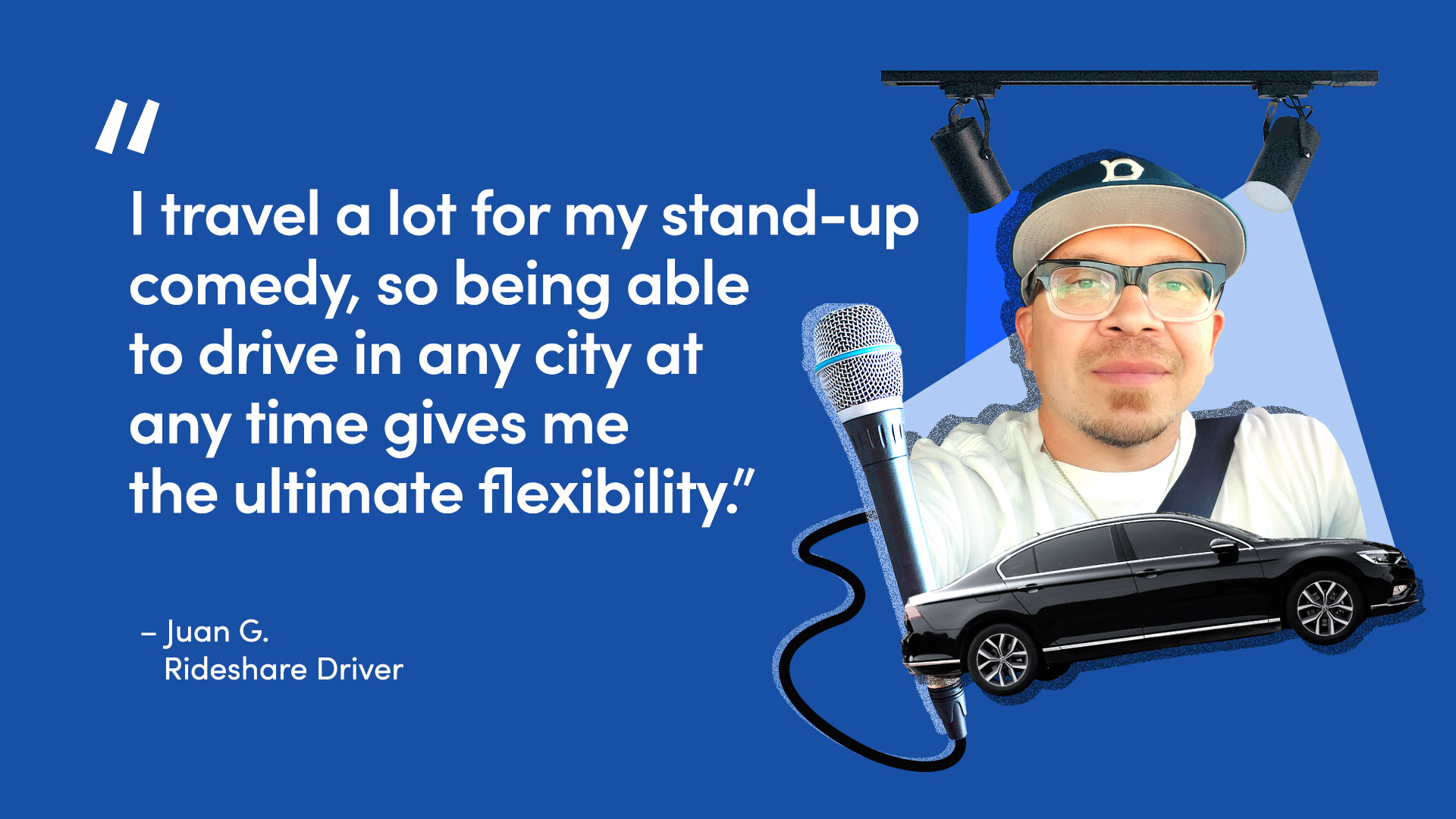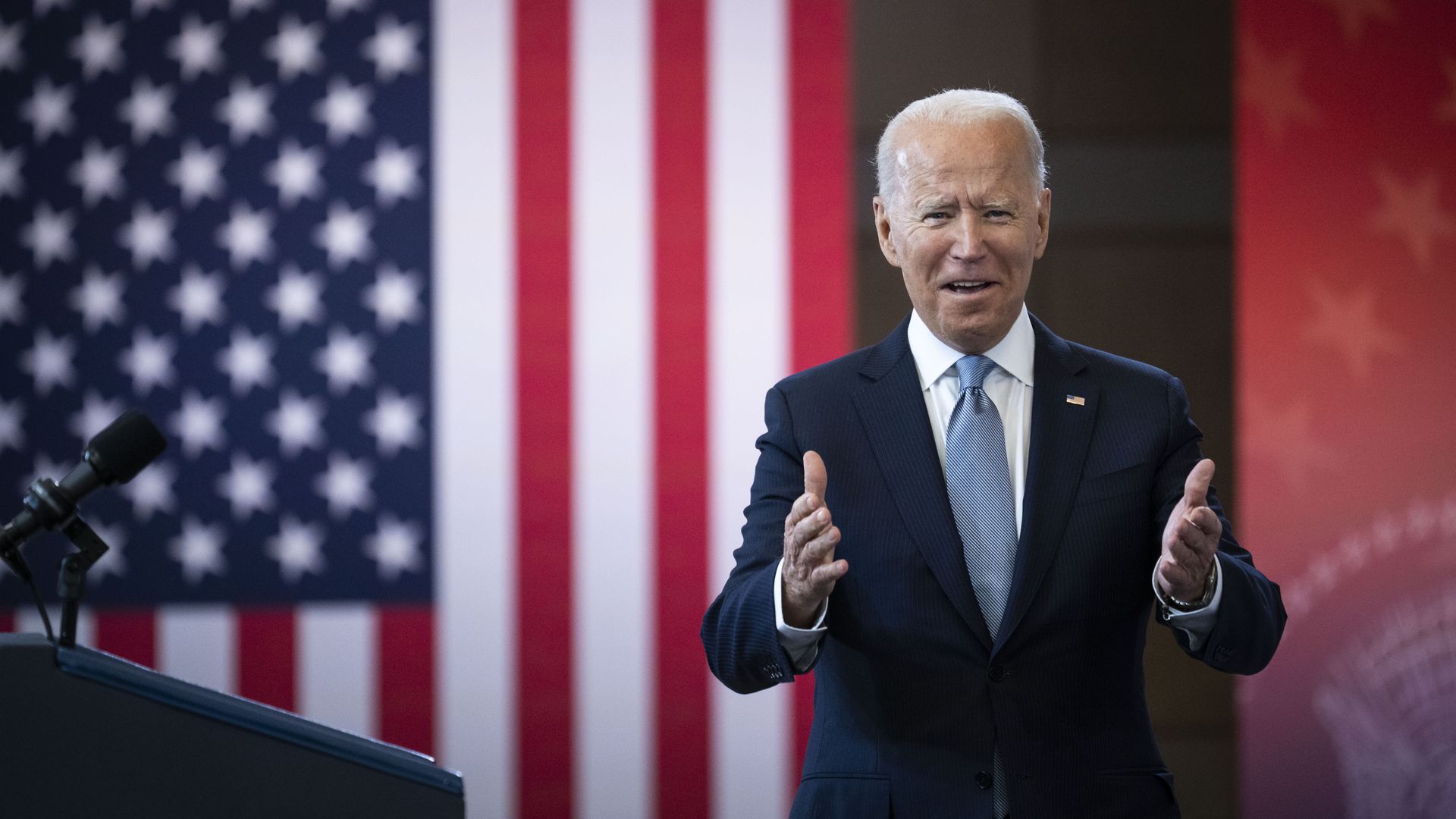| | | | | | | Presented By Lyft | | | | Axios Sneak Peek | | By Alayna Treene and Hans Nichols ·Jul 13, 2021 | | Welcome back to Sneak. Joe from Scranton delivered a speech in Philly. ⚡ Situational awareness: House Democrats have organized a bipartisan briefing on ransomware and cyber-hacking at 7pm tomorrow with national security adviser Jake Sullivan, according to a members-only invite reviewed by Axios' Sarah Mucha. Smart Brevity™ count: 975 words ... 3.5 minutes. Edited by Glen Johnson. | | | | | | 1 big thing: Dems' House hopes hang on two states |  | | | Illustration: Shoshana Gordon/Axios | | | | The Democrats' "only chance of keeping the House" next year is if they redraw congressional lines to their advantage in New York and Illinois, Cook Political Report's David Wasserman tells Axios' Stef Kight. Why it matters: The GOP is already poised to take advantage of its control of map-drawing in more states than Democrats. But Democrats have a chance to eliminate as many as seven Republican House seats in just New York and Illinois through redistricting in states they control. - New York and Illinois are both set to lose a House seat because of slower population growth.
- On top of ensuring Republican districts are the ones lost to reapportionment this year, Democrats could rework the maps to help them pick up an additional four districts in New York and one in Illinois, said Wasserman, who focuses on redistricting as Cook's House editor.
The big picture: Republicans will get to draw congressional district lines in big battleground states like Texas, Georgia, North Carolina and Florida. They were able to draw maps to maximize their partisan advantage after the 2010 census too. - "The two states that Democrats control that are big, or where there's margin left, are New York and Illinois," Ben Williams, a nonpartisan redistricting specialist for the National Conference of State Legislatures, told Axios.
- Few other states offer options to create new, blue congressional districts, he and Wasserman said.
- "Just by correcting the horrors of what the Republicans have done will be an advantage," New York State Senate Deputy Majority Leader Michael Gianaris, a top Democrat on redistricting, told Axios. "If we do it fairly, we're going to gain seats."
What they're saying: Despite the Democratic hopes, there are checks on blatant partisan gerrymandering — especially in New York, said Kelly Ward Burton, president of the National Democratic Redistricting Committee. - While New York has an independent commission in charge of redistricting, it's likely that the process ultimately gets kicked to the Democratic-controlled state legislature.
- Even then, state law restricts partisan gerrymandering.
- In Illinois, Democrats control the process entirely.
The intrigue: In New York, drawing the safest maps for Democrats could mean propping up Republicans like Rep. Elise Stefanik (R-N.Y.). - Under a scenario outlined by Wasserman, her district would get redder in order to benefit Democrats elsewhere.
- But Gianaris and others pointed out that final U.S. Census Bureau data used for line-drawing hasn't been released, so details about how maps might turn out remain unclear.
|     | | | | | | 2. By the numbers: Supreme Court splits |  Data: Ballotpedia; Chart: Will Chase/Axios More than half of the state supreme courts in the United States have a majority of justices affiliated with the Republican Party, according to a Ballotpedia study reviewed by Stef. Why it matters: Gerrymandering challenges amid this year's redistricting process and disputes about changes to voting rights — issues with the potential to radically change future election outcomes — would, in some cases, be heard by these courts. By the numbers: About 52% of the 341 state justices Ballotpedia studied are affiliated with the GOP, compared to a third affiliated with Democrats. The researchers were unable to determine partisan affiliations for the remaining 49. - Eight of the nine justices on Washington state's court of last resort were found to be affiliated with the Democratic Party — more than any other state.
- Texas has the most Republican-affiliated justices, with 18 out of 18 in its two courts of last resort.
|     | | | | | | 3. Biden's ethics thorn |  | | | Walter Schaub. Photo: Mark Wilson/Getty Images | | | | The biggest critic of the Biden White House's ethics program isn't a Republican, congressional investigator or whistleblower — it's an ex-federal employee with a huge social media following, Axios' Lachlan Markay reports. Driving the news: Walter Shaub — who directed the Office of Government Ethics from 2013 to mid-2017, and was an outspoken critic of corruption under former President Trump — has gone from Biden administration job-seeker to foremost critic of what he sees as its lackluster approach to ethics and transparency. What they're saying: "I wound up, I think, drawing two different types of people: those who truly care about democracy and those who just didn't like Trump," Shaub tells Axios. - "And now the wheat and the chaff are separating and I'm keeping the ones who truly care about government ethics and losing the ones who only cared about Trump."
Shaub says he voted for President Biden and even sought work in the White House or a federal agency. But his frequent broadsides since have provided plenty of ammunition for Biden's critics. - The Republican National Committee is the latest to seize on Shaub's public pronouncements, circulating cable news clips of him criticizing the Biden White House's treatment of high-profile ethics matters.
The big picture: Shaub argues the Biden administration has taken a lawyerly, compliance-focused approach and is "pretty good at following the literal rules of government ethics." - It falls short of addressing an existential threat to institutions designed to root out corruption and self-dealing.
- "We've just come through a four-year period when we learned that our rules, our laws, our existing systems for government ethics, were always too weak and were ripe for being kicked over by a corrupt official," he said.
Details: Shaub points to a few examples he says underscore the problems. - Hunter Biden's art career: Shaub says the White House's refusal to disclose more information about the people reportedly paying hundreds of thousands of dollars for the president's son's art creates a potentially huge opportunity for corruption.
- The Energy secretary's investments: Jennifer Granholm took flack for her investment — since divested — in a renewable energy firm promoted by the White House. It's "probably technically legal," Shaub says, but looks terrible.
- The Ricchetti family: Biden counselor Steve Ricchetti's brother is a lobbyist, and other members of his family are sprinkled throughout the administration. Shaub says it reeks of nepotism.
Keep reading. |     | | | | | | A message from Lyft | | Drivers want flexibility – so maintaining independence is essential | | |  | | | | Drivers use the Lyft platform when it suits their needs. - 96% of drivers work elsewhere or are students in addition to driving with Lyft.
They depend on the flexibility that independent contracting provides. Learn more in Lyft's Economic Impact Report. | | | | | | 4. Pic du jour |  | | | Photo: Drew Angerer/Getty Images | | | | President Biden joked as he arrived at the National Constitution Center that "I used to be important" — chairman of the organization's board of directors. |     | | | | | | A message from Lyft | | Drivers have spoken, and they want to maintain their independence | | |  | | | | Drivers use the Lyft platform to make work work for them. Outside of Lyft, they are parents, full-time employees, small-business owners, students, and teachers. They need the flexibility that independent contracting provides. Lyft is committed to what drivers want. | | | | 📬 Thanks for reading. A reminder your family, friends and colleagues can subscribe to this or any of Axios' other free newsletters by clicking here. |  | | It'll help you deliver employee communications more effectively. | | | | | | Axios thanks our partners for supporting our newsletters. If you're interested in advertising, learn more here.
Sponsorship has no influence on editorial content. Axios, 3100 Clarendon Blvd, Suite 1300, Arlington VA 22201 | | | You received this email because you signed up for newsletters from Axios.
Change your preferences or unsubscribe here. | | | Was this email forwarded to you?
Sign up now to get Axios in your inbox. | | | | Follow Axios on social media:    | | | | | |









No comments:
Post a Comment